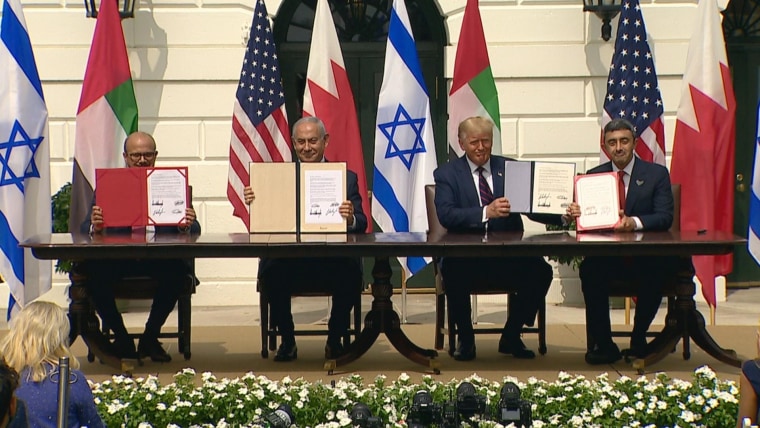As dignitaries gathered on the White House South Lawn on Tuesday to witness the singing of U.S.-brokered deals between Israel and two Gulf Arab states, the situation thousands of miles away on Israel's doorstep was less serene.
Some 15 rockets were launched from Gaza into southern Israel, the Israel Defense Force said, prompting the country's air force to retaliate with a strike on targets in the Palestinian enclave.
The signing of the accords was greeted by angry protests by Palestinians in Gaza and the West Bank. Pictures of President Donald Trump, Israeli Prime Minister Benjamin Netanyahu and the leaders of the United Arab Emirates and Bahrain were trampled and flags set on fire. More protests were underway on Friday.
Speaking from a White House balcony, Trump declared the deals "the dawn of a new Middle East" and said at least five or six other Arab states were set to join the "Abraham Accords."
But though Trump described the agreements as peace deals, the reaction from Palestinians was a stark reminder that the agreements are not seen as such by many in the region.
The pacts have been criticized by Iran, Turkey and Qatar. The biggest Gulf power, Saudi Arabia, has remained silent, leading to speculation that the kingdom quietly approves of the agreements but is reluctant to openly support them.
The bilateral agreements themselves are full of pledges to advance diplomacy, mutual cooperation and work toward regional peace. Israel's deal with the UAE is more comprehensive, outlining 15 areas of mutual interest, including finance, trade, aviation, energy, health, agriculture and water.
But critics argue they do not fully address one of the Middle East's central fault lines: the decades-long conflict between Israel and the Palestinians, who view the pacts as a betrayal of their cause for a Palestinian state.
"The Palestinians have been completely thrown under the bus here," said Trita Parsi, executive vice president of the Quincy Institute for Responsible Statecraft, a Washington-based foreign policy think tank.
"The real peace that is needed, the one that is actually worth celebrating, is if there's something that can be achieved between the Israelis and Palestinians," he said.
Parsi added that far from establishing peace, the accords merely brought existing "clandestine relationships" between the countries out in the open.
The bilateral agreements formalize the normalization of Israel's already thawing relations with the UAE and Bahrain, in line with their common enemy, Iran.
"I'm not surprised that the Palestinian terrorists fired at Israel precisely during this historic ceremony," Netanyahu said after the ceremony. "They want to turn back the peace. In that, they will not succeed."
Speaking to Fox News hours before the signing ceremony, Trump predicted the Palestinians would eventually forge peace with Israel or else be "left out in the cold."
But Palestinians say there can be no resolution of the Israeli-Palestinian conflict unless they are involved.
"The core of the conflict is the Palestinian cause. These agreements will never achieve security or stability or peace," Ahmad Majdalani, executive committee member of the Palestine Liberation Organization, told reporters on Thursday.
"This illusion that Netanyahu has about making peace with the Arabs without making peace with the Palestinians or withdrawing from the occupied territories is just that — an illusion."
Download the NBC News app for breaking news and politics
Representatives of both the UAE and Bahrain, who sent their foreign ministers rather than heads of state, spoke of the importance of creating a Palestinian state. But neither Netanyahu nor Trump mentioned the Palestinians in their remarks.
Emirati Foreign Minister Sheikh Abdullah bin Zayed al-Nahyan thanked Netanyahu for "halting the annexation" of West Bank land claimed by the Palestinians, in exchange for Emirati recognition.
Netanyahu, however, has insisted that Israel has only "suspended" its plans to annex parts of the West Bank.
In January,the U.S. abandoned a position it had held for four decades, that Jewish settlements in the West Bank were inconsistent with international law.
"This is the first warm peace the Israelis have had," Efraim Inbar, president of the Jerusalem Institute for Strategy and Security, told NBC News. "In Israel almost everyone is happy with the deal."
He said the deals Israel already had with Jordan and Egypt hadn't led to tangible exchanges, tourism or meaningful free movement of people or businesses. He said he hopes this will be possible with the UAE and Bahrain.
He said the deals showed that Palestinians had been "obviously sidelined" by Arab states and warned that their ambitions may be unrealistic.
"In my opinion, they have to calibrate their expectations of what can be achieved," Inbar said. "That's part of maturity. Unfortunately, the Palestinian liberation national movement still has dreams that are unlikely to be achieved."
In August, the first direct commercial flight between Israel and the UAE took place with Jared Kushner, Trump's son-in-law and senior adviser, on board. Since Tuesday's ceremony, deals have already been struck between the two nations' diamond exchanges, port operators and investment offices, although some friction remains around the U.S. sale of stealth F-35 fighter jets to the UAE.
"The deal is more symbolic than reflective of a substantive shift. It is the latest indicator of a shift in Arab politics from being defined against Israel to being defined against Iran," said Simon Mabon, a professor at Lancaster University in England.
Inbar agreed that to call the accords a groundbreaking peace deal would be "exaggerated."
"Some Arab countries came out of the closet," he said. "I wouldn't say the messiah has come to the Middle East, not yet."
Reuters and The Associated Press contributed to this report.
World - Latest - Google News
September 18, 2020 at 06:51PM
https://ift.tt/3hL0ypn
Progress, not peace: Breaking down the Trump-brokered deals between Israel, Arab states - NBC News
World - Latest - Google News
https://ift.tt/2SeTG7d
Bagikan Berita Ini















0 Response to "Progress, not peace: Breaking down the Trump-brokered deals between Israel, Arab states - NBC News"
Post a Comment